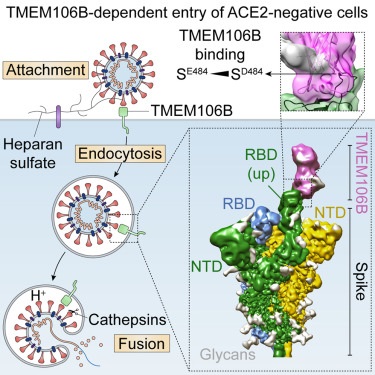BREAKING NEWS! Belgian Study Uncovers New SARS-CoV-2 Cell Entry Mechanism With Worrisome Implications For Neurodegenerative Diseases And Cancer!
Thailand Medical - SARS-CoV-2 Cell Entry - TMEM106B - Neurodegenerative Diseases - Cancer Jul 08, 2023 2 years, 7 months, 2 weeks, 2 days, 15 hours, 28 minutes ago
Study Found That SARS-CoV-2 Can Use TMEM106B For Cell Entry And The Mutation E484D Enhances Its Binding!
Thailand Medical: In a new study conducted by the KU Leuven Department of Microbiology at the Rega Institute in Belgium, along with researchers from the Francis Crick Institute in the UK and Alector LLC in San Francisco, a significant but alarming discovery has been made regarding the entry mechanism of SARS-CoV-2, the virus responsible for the COVID-19 pandemic.
 Study Abstract
The study shockingly revealed that the SARS-CoV-2 virus can also utilize a protein called TMEM106B as an alternative receptor for cell entry, independent of the widely known ACE2 receptor.
The findings of this study have profound implications as TMEM106B is abundantly present in tissues such as the brain, heart, thyroid, adrenal glands, and testes, all of which have been associated with neurodegenerative disorders and cancer.
TMEM106B has been implicated in various diseases including frontotemporal lobar degeneration (FTLD), amyotrophic lateral sclerosis (ALS), Alzheimer's disease, Parkinson's disease, and lung cancer metastasis. The identification of TMEM106B as a receptor for SARS-CoV-2 opens up new avenues for understanding the virus's impact on these diseases.
The study team demonstrated that TMEM106B directly engages with the receptor-binding domain of the spike protein of SARS-CoV-2, and a specific mutation known as E484D found in many of the new SARS-CoV-2 sub-lineages enhances the binding affinity of TMEM106B.
This could perhaps explain why some of the newer SARS-CoV-2 sub-lineages are exhibiting tropism towards the tissues of the brain, heart, thyroid and adrenal glands and the testes and the rise of certain long COVID manifestations associated with these organs and tissues.
Study Abstract
The study shockingly revealed that the SARS-CoV-2 virus can also utilize a protein called TMEM106B as an alternative receptor for cell entry, independent of the widely known ACE2 receptor.
The findings of this study have profound implications as TMEM106B is abundantly present in tissues such as the brain, heart, thyroid, adrenal glands, and testes, all of which have been associated with neurodegenerative disorders and cancer.
TMEM106B has been implicated in various diseases including frontotemporal lobar degeneration (FTLD), amyotrophic lateral sclerosis (ALS), Alzheimer's disease, Parkinson's disease, and lung cancer metastasis. The identification of TMEM106B as a receptor for SARS-CoV-2 opens up new avenues for understanding the virus's impact on these diseases.
The study team demonstrated that TMEM106B directly engages with the receptor-binding domain of the spike protein of SARS-CoV-2, and a specific mutation known as E484D found in many of the new SARS-CoV-2 sub-lineages enhances the binding affinity of TMEM106B.
This could perhaps explain why some of the newer SARS-CoV-2 sub-lineages are exhibiting tropism towards the tissues of the brain, heart, thyroid and adrenal glands and the testes and the rise of certain long COVID manifestations associated with these organs and tissues.
The discovery of TMEM106B as an ACE2-independent receptor for SARS-CoV-2 sheds light on the broad tissue tropism exhibited by the virus.
Corresponding author, Dr Jim Baggen from the Laboratory of Virology and Chemotherapy at Rega Institute told
Thailand Medical News, “
Additionally, the study showed that TMEM106B promotes the formation of syncytium, a type of cell fusion induced by the spike protein.”
Previous studies have primarily focused on ACE2 as the main receptor, but it has been observed that SARS-CoV-2 can infect cells that lack detectable ACE2 expression.
The ability of the virus to infect ACE2-negative cells has been attributed to t
he E484D mutation in the spike protein. This study provides the underlying mechanism for this phenomenon by revealing the role of TMEM106B in facilitating viral entry.
The study employed advanced techniques including X-ray crystallography, cryogenic electron microscopy, and hydrogen-deuterium exchange mass spectrometry to investigate the interaction between TMEM106B and the spike protein. The study team identified the specific region on TMEM106B and the spike protein responsible for their binding.
While ACE2 remains the best-characterized receptor for SARS-CoV-2, the discovery of TMEM106B as an alternative receptor suggests that multiple entry mechanisms may exist. The researchers speculate that TMEM106B could play a role in ACE2-mediated infection as well. Further investigations are required to fully understand the interplay between these receptors and their contribution to viral entry.
Importantly, the study highlights the potential of TMEM106B as a therapeutic target. Monoclonal antibodies specifically targeting TMEM106B were found to block SARS-CoV-2 infection, offering the possibility of developing effective treatments against the virus.
Moreover, given the involvement of TMEM106B in neurodegenerative diseases and cancer metastasis, modulating its activity may hold promise for therapeutic interventions in these conditions. The identification of TMEM106B as a receptor opens up new avenues for drug development and further research to unravel the physiological functions of TMEM106B.
Conclusion
This insightful Belgian study uncovers a previously unknown SARS-CoV-2 entry mechanism involving the TMEM106B protein. The discovery has far-reaching implications for understanding the virus's impact on neurodegenerative diseases and cancer, while also providing potential targets for therapeutic intervention. Further research in this area will undoubtedly deepen our understanding of the complex interplay between SARS-CoV-2 and host cells and hopefully pave the way for novel strategies to combat the ongoing pandemic and associated diseases.
The study findings were published in the peer reviewed journal: Cell.
https://www.cell.com/cell/fulltext/S0092-8674(23)00645-1
For the latest on SARS-CoV-2 Research, keep on logging to
Thailand Medical News.
